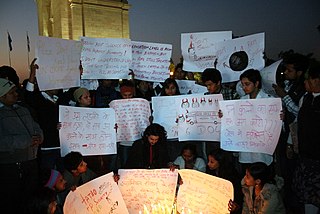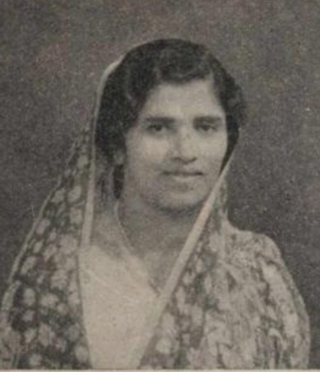A dowry is a payment, such as land property, monetary, cattle or any commercial asset that is paid by the bride's family to the groom or his family at the time of marriage.

The status of women in India has been subject to many changes over the time of recorded India's history. Their position in society underwent significant changes during India's ancient period, particularly in the Indo-Aryan speaking regions, and their subordination continued to be reified well into India's early modern period.
Bride burning is a form of domestic violence practiced in countries located on or around the Indian subcontinent. A form of dowry death, bride-burning occurs when a woman is murdered by her husband or his family for her family's refusal to pay additional dowry. The wife is typically doused with kerosene, gasoline, or other flammable liquid, and set alight, leading to death by burning. Kerosene is often used as the cooking fuel for small petrol stoves, some of which are dangerous, so it allows the claim that the crime was an accident. It is most common in India and has been a major problem there since at least 1993.
Dowry deaths are deaths of married women who are murdered or driven to suicide over disputes about dowry. Dowry deaths are found predominantly in India, Pakistan, Bangladesh, and Iran. For context, dowry are the material exchange that the brides give the groom's side in the course of a wedding.

Feminism in India is a set of movements aimed at defining, establishing, and defending equal political, economic, and social rights and opportunities for women in India. It is the pursuit of women's rights within the society of India. Like their feminist counterparts all over the world, feminists in India seek gender equality: the right to work for equality in wages, the right to equal access to health and education, and equal political rights. Indian feminists also have fought against culture-specific issues within India's patriarchal society, such as inheritance laws.

The National Commission for Women (NCW) is a statutory body of the Government of India, generally concerned with advising the government on all policy matters affecting women. It was established on 31 January 1992 under the provisions of the Indian Constitution, as defined in the 1990 National Commission for Women Act. The first head of the commission was Jayanti Patnaik. As of 19 October 2024, Vijaya Kishore Rahatkar is the chairperson.

The men's rights movement in India is composed of various independent men's rights organisations in India. Proponents of the movement support the introduction of gender-neutral legislation and repeal of laws that are biased against men.
Crime in India has been recorded since the British Raj, with comprehensive statistics now compiled annually by the National Crime Records Bureau (NCRB), under the Ministry of Home Affairs (India).
Gender inequality in India refers to health, education, economic and political inequalities between men and women in India. Various international gender inequality indices rank India differently on each of these factors, as well as on a composite basis, and these indices are controversial.
Pramila Dandavate (1928–2001) was a political activist from Mumbai, associated with the Praja Socialist Party and later with the Janata Party.

Domestic violence in India includes any form of violence suffered by a person from a biological relative but typically is the violence suffered by a woman by male members of her family or relatives. Although men also suffer domestic violence, the law under IPC 498A specifically protects only women. Specifically only a woman can file a case of domestic violence. According to a National Family and Health Survey in 2005, total lifetime prevalence of domestic violence was 33.5% and 8.5% for sexual violence among women aged 15–49. A 2014 study in The Lancet reports that although the reported sexual violence rate in India is among the lowest in the world, the large population of India means that the violence affects 27.5 million women over their lifetimes. However, an opinion survey among experts carried out by the Thomson Reuters Foundation ranked India as the most dangerous country in the world for women.
Rape is the fourth most common crime against women in India. According to the 2021 annual report of the National Crime Records Bureau (NCRB), 31,677 rape cases were registered across the country, or an average of 86 cases daily, a rise from 2020 with 28,046 cases, while in 2019, 32,033 cases were registered. Of the total 31,677 rape cases, 28,147 of the rapes were committed by persons known to the victim. The share of victims who were minors or below 18 – the legal age of consent – stood at 10%.

The 2012 Delhi gang rape and murder, commonly known as the Nirbhaya case, involved a rape and fatal assault that occurred on 16 December 2012 in Munirka, a neighbourhood in South Delhi. The incident took place when Jyoti Singh, a 22-year-old physiotherapy intern, was beaten, gang-raped, and tortured in a private bus in which she was travelling with her male friend, Avnindra Pratap Pandey. There were six others in the bus, including the driver, all of whom raped the woman and beat her friend. She was rushed to Safdarjung Hospital in Delhi for treatment and, as the public outrage mounted, the government had her transferred to Mount Elizabeth Hospital, Singapore eleven days after the assault, where she succumbed to her injuries two days later. The incident generated widespread national and international coverage and was widely condemned, both in India and abroad. Subsequently, public protests against the state and central governments for failing to provide adequate security for women took place in New Delhi, where thousands of protesters clashed with security forces. Similar protests took place in major cities throughout the country. Since Indian law does not allow the press to publish a rape victim's name, the victim was widely known as Nirbhaya, meaning "fearless", and her struggle and death became a symbol of women's resistance to rape around the world.
Violence against women in Tamil Nadu includes molestation, abduction, dowry-related violence, and domestic violence. The police recorded 1,130 cases during the first seven months in 2013, compared to 860 for the corresponding period in 2012. In Usilampatti Taluk, around 6,000 female children were killed in a span of 2 years during 1987–88, accounting to the single largest instance of recorded female infanticide.

Violence against women in India refers to physical or sexual violence committed against a woman, typically by a man.

The 2003 Nisha Sharma dowry case was an anti-dowry lawsuit that has been cited as an illustrative example highlighting the potential for misuse of the IPC 498A law in India.

Achamma Mathai was an Indian social worker, women's rights activist, a co-founder of Dr. John Mathai Centre, an institute of Information Technology, Economics, Management, Theatre Arts and Music under the University of Calicut and the wife of John Mathai, the first Railway Minister of India and a former Finance minister. During her stay in Delhi, when her husband was serving in the Union Ministry, she was reported to have been involved in activities related to children's education. During the riots that followed Indian independence, she worked alongside Sucheta Kripalani for the rehabilitation of the riot victims. She served as a member of the Advisory Committee for Libraries in 1955 and as the chairperson of the Central Social Welfare Board in the early Sixties. The Government of India honoured her in 1954, with the award of Padma Shri, the fourth highest Indian civilian award for her contributions to the society, placing her among the first recipients of the award.
The dowry system in India refers to the durable goods, cash, and real or movable property that the bride's family gives to the groom, his parents and his relatives as a condition of the marriage. Dowry is called "दहेज" in Hindi and as جہیز in Urdu.

The History of Doing: An Illustrated Account of Movements for Women's Rights and Feminism in India 1800–1990 is a book by Radha Kumar. First published in 1993 in New Delhi by Kali for Women after a Norwegian organisation's grant of Rs 1.4 lakh, and later published by Zubaan and Verso, the illustrated book is "a brief interpretative history of women's movements in India from the beginning of the nineteenth century until the present day", as the first line of the introduction concisely conveys.
Shahjehan Aapa was a women’s rights activist from India. After one of her daughters was murdered in a dowry death, Aapa was inspired to start a life of feminist activism, working alongside other Indian women and mothers to combat dowry murders, redress, and sexism in India. In 1987, Shahjehan Aapa co-founded the organization Shakti Shalini, which, centered in New Delhi, works to combat gender-based violence and provide support to thousands of Indian women.








